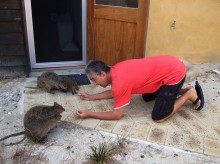Dr. David McCartney of Lothians and Edinburgh Abstinence Programme (LEAP) talks to David Clark about the development of his drinking problem whilst working as a GP in an inner-city practice in Scotland. He describes an unsuccessful attempt at sobriety, which involved a medical approach focused on prescribing. In crisis, he later called the Sick Doctors Trust Helpline and was told a doctor’s personal recovery story. That telephone call gave him hope and the opportunity to take his own journey to recovery. David talks about setting up LEAP and about facilitating recovery in the community. [15 films, 76 mins 11 secs]
‘Lessons from Rehab’: David McCartney
 Here’s another excellent blog post by Dr. David McCartney on the Recovery Review blog.
Here’s another excellent blog post by Dr. David McCartney on the Recovery Review blog.
In 2005, concerned at the lack of choice in addiction treatment in Scotland and hearing frustrations from patients and families around lack of access to residential treatment, I sought support and funding to set up a drug and alcohol rehab service based on the therapeutic community (TC) model. This would be unique in Scotland as, based in the NHS, it would be free at the point of delivery, eliminating difficult funding pathways.
I proposed the service should serve a local population to keep people close to their families and allow them to develop local recovery supports and access intensive aftercare. It should develop close working relationships with other treatment and support options – this should be an ‘as-well-as’ service rather than an ‘instead-of’ service. There should be direct family support and detox offered as part of the deal. We would actively connect people to recovery resources in the community, offer them peer support and open avenues into education, training and employability.
Outcomes from rehab in Scotland (and even the UK) at the time were hard to find – but so were any treatment outcomes from services already in operation, so I built in that we should commission a robust evaluation. If this wasn’t going to work, we needed to know that – and if it helped people achieve their goals we wanted to get that message (and any other learning) out there.
Is Rehab Effective? The Results Are In: Dr. David McCartney
 Here is another great blog post from Dr. David McCartney of Lothians & Edinburgh Abstinence Programme (LEAP) on the Recovery Review blog.
Here is another great blog post from Dr. David McCartney of Lothians & Edinburgh Abstinence Programme (LEAP) on the Recovery Review blog.
‘Recovery journeys are dynamic, take time and for those who receive treatment, may need several episodes. For some, residential rehab is part of the journey, just as harm reduction interventions can also be part of the journey. However, residential rehabilitation is a complex intervention and complex interventions are difficult to study.
In Scotland, the government is making rehab easier to access and growing the number of beds. This development is not without its critics. Some feel the resource needs to ‘follow the evidence’ – in other words into harm reduction and MAT interventions. This all-the-eggs-in-one-basket position would reinforce the rigid barriers that make rehab the domain of the wealthy or the lucky.
‘Follow the evidence’ in this context is a refrain that implies that there is no evidence that rehab works to help people achieve their goals and improve their quality of life. That is simply not true. Last month saw the publication of a literature review on residential rehab by Scottish Government researchers. It’s a thorough piece of work. This summary of the research evidence provides verification that “that residential rehabilitation is associated with improvements across a variety of outcomes relating to substance use, health and quality of life”.
Kevin Kennedy Opens Up About Beating His Alcohol Addiction: This Morning
Former Coronation Street star Kevin Kennedy reveals how bad his alcoholism got, and what he did to overcome it. 5 January 2017. [5’46”]
‘The monkey on my back’ by Recovery Coach
 Here’s some powerful writing from one of our bloggers on Wired In To Recovery.
Here’s some powerful writing from one of our bloggers on Wired In To Recovery.
‘Most people have heard the words ‘monkey on my back’ used as a term for defining addiction. Personally, I find the word ‘addiction’ too soft a word to describe the monster every addict or alcoholic battles in daily life. It’s too clinical, too sterile, and just doesn’t pack the same punch as the monkey analogy.
As a hardcore alcoholic for more than half my life, I learned a few things about the monkey.
‘Detoxification: The nuts and bolts’ by Peapod
 Why not check out the second of Peapod’s articles in his Recovery Guide, an article which focuses on detox and beyond?
Why not check out the second of Peapod’s articles in his Recovery Guide, an article which focuses on detox and beyond?
‘Okay, youʼve got to the point where you are looking to detox but youʼre not sure what the nuts and bolts of it are. How do you go about it and how do you know you are ready? What can you do to boost success?
Here are my suggestions, which are based on guidance and my own experience of working with hundreds of people going through detox.’


